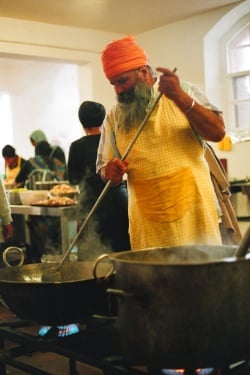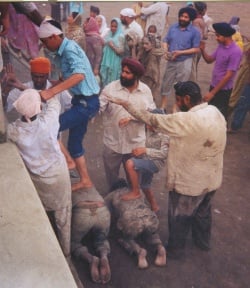Seva
| Part of a series on Sikh Practices |
| Sikhism |
| Sanskar |
| Sikh rites |
| Personal 5 Banis . Five ks |
Seva also Sewa, short for the word Karseva refers to "selfless service", work or service performed without any thought of reward or personal benefit. In the Punjabi language the person performing such service is called a Sevadar.
All Sikhs are encouraged by their Guru (Guru Granth Sahib) to perform Seva or Selfless Service. This is not only good for community relations but also is good for the moral uplifting of the person. You will find Sikhs engaged in free service in Gurdwaras washing dishes, cleaning the floors, serving food, etc.
Sikhs are also encouraged to help the community by performing unpaid work in hospitals, 'old peoples' homes, community centres, etc. Volunteers engaged in Seva are referred to as Sevadars and for many people this activity forms an essential part of their life, providing spiritual fulfilment and practical benefits.
Sikhism is founded on principles of Sarbat da bhalla - working towards the "common good of all". For Sikhs, this means reaching out to serve and uplift all of humanity as an expression or devotion to the Creator. Many other Sikh institutes, such as Guru-ka-Langar, Kirtan, Paath, etc., depend on the performance of Seva by many in the congregation. So the principles of Seva underpin many Sikh values - such is the importance given to Seva in Sikhism.
What does Gurbani say?
This point is highlighted by the Guru in many places in the Guru Granth Sahib. The text explains the spiritual benefits of doing seva and the ways in which one should perform it, focussing on the state of the mind when performing seva.
- 1. The importance of selfless seva is highlighted by the Guru in this verse: "ਸੇਵਾ ਕਰਤ ਹੋਇ ਨਿਹਕਾਮੀ ॥ ਤਿਸ ਕਉ ਹੋਤ ਪਰਾਪਤਿ ਸੁਆਮੀ ॥ One who performs selfless service, without thought of reward, shall attain his Lord and Master." (SGGS p 286) The Guru states that one who perform selfless service without desire for reward will certainly attain liberation. The need to be "desire-less" ("nehkaami") is critical in making this action fruitful. When one does Seva, one should just do it without any thought for a return - think of it as a duty to the society.
- 2. Guru tells the followers that peace can be obtained through Sewa: "ਸੁਖੁ ਹੋਵੈ ਸੇਵ ਕਮਾਣੀਆ ॥ You shall find peace, doing seva" (SGGS p 25) Doing seva bring its own tranquillity and serenity which you cannot find in doing anything else. For a Sikh, simran and seva are the spiritual right and left hand. As a Sikh, you must do both to keep a balance. These are like the two wings of a bird - the bird must use both otherwise it will not be able to fly.
- 3. A Sikh has to make a concerted effort to seek opportunities to perform Seva. One has to focus ones mind on this duty and ones human function so that the opportunity of this life are not wasted. When you perform Seva, the mind should recite Gurbani: "ਸੇਵਾ ਸੁਰਤਿ ਸਬਦਿ ਚਿਤੁ ਲਾਏ ॥ Center your awareness on seva and focus your consciousness on the Word of the Shabad." (SGGS p 110)
- 4. Three things are necessary to obtain salvation and liberty and they are: To perform Seva, to follow Gurbani and to do Simran: "ਕਰਿ ਸੇਵਾ ਭਜੁ ਹਰਿ ਹਰਿ ਗੁਰਮਤਿ ॥ Do seva, follow the Guru’s Teachings, and vibrate on the Lord’s Name, Har, Har." (SGGS p 176)
- 5. The Guru confirms that doing pure seva for the Almighty is tough and one needs to "surrender" their head and abandon selfishness. So make sure that you have humility in your mind and "nimrata" (without "ego" or "pride") before you undertake seva. The Guru's instructions are: "ਸਤਗੁਰ ਕੀ ਸੇਵਾ ਗਾਖੜੀ ਸਿਰੁ ਦੀਜੈ ਆਪੁ ਗਵਾਇ ॥ ਸਬਦਿ ਮਿਲਹਿ ਤਾ ਹਰਿ ਮਿਲੈ ਸੇਵਾ ਪਵੈ ਸਭ ਥਾਇ ॥ "It is very difficult to serve the True Guru. Surrender your head; give up your selfishness. Realizing the Shabad, one meets with the Lord, and all one's service is accepted"." (SGGS p 27)
- 6. Finally, in the following verse the Guru informs the devotee that performing seva in the correct fashion will bring you "honour in the Lord's Court" thus: "ਵਿਚਿ ਦੁਨੀਆ ਸੇਵ ਕਮਾਈਐ ॥ ਤਾ ਦਰਗਹ ਬੈਸਣੁ ਪਾਈਐ ॥ In the midst of this world, do seva, and you shall be given a place of honor in the Court of the Lord." (SGGS p 26)
Detailed Account
SEVA, from the Sanskrit root sev meaning to serve; wait or attend upon; honour; or worship, is usually translated as ‘service’ or ‘serving’ which commonly relates to work for which one is paid. This, however, does not convey the sense in which the term is used in the Sikh tradition.
The word seva has, in fact had two distinct connotations:
- First, it means to serve, to attend to, to render obedience to.
- Secondly, it means to worship, to adore, to reverence, to pay homage to.
Traditionally in the Indian (Hindu) society, seva in the sense of worship (of gods) has been the preserve of the high-caste Brahmans, while that in the sense of service (to man) has been relegated to the lowest of the castes. In the Sikh sense, the two connotations seem to have merged together for the reasons:
- First, because of its egalitarian stance Sikhism does not recognize caste distinctions. Hence Sikhi has no distinctive caste roles.
- Second, God in Sikhism is not apart from His creations. "He pervades His Creation" (GG, 1350).
Therefore service rendered to humanity (i.e. God in man) is indeed considered a form of worship. In fact, in Sikhism, "no worship is conceivable without seva" (GG, 1013). The Sikh is forbidden from serving anyone apart from God ("Serve you the Lord alone: none else must you serve" (GG, 490)).
However, this also means, that whomsoever we serve, we are really serving our Lord through her/him. Therefore it becomes incumbent upon the Sikh to render seva with the highest sense of duty since thereby he or she is worshipping the Lord.
| Part of a series on Sikh Beliefs |
| Sikhism |
|
2. Three Pillars |
|
3. Five Evils |
|
4. Five Virtues |
Seva in Sikhism is imperative for spiritual life. It is the highest penance (GG, 423). It is a means to acquiring the highest merit. The Sikh often prays to God for a chance to render seva. Says Guru Arjan, Nanak V, “I beg to serve those who serve you (GG, 43)” and “I, your servant, beg for seva of your people, which is available through good fortune alone (GG, 802).” According to Guru Amar Das, “He who is turned towards the Guru finds repose and joy in seva” (GG, 125).
Three varieties of seva are sanctioned in Sikh lore:
- That rendered through physical means - "taan"
- That rendered through the mental apparatus "maan"
- That rendered through one's material resources "dhan".
The first of these is considered to be the highest of all and is imperatively prescribed for every Sikh. “Cursed are the hands and feet that do not engage in seva” (Bhai Gurdas, Varan, 27.1).
In traditional Indian society work involving physical labour was considered low and relegated to the lowest castes. By sanctifying manual labour as an honourable religious practice, the Sikh Gurus established the dignity of labour, a concept then almost unknown to Indian society. Not only did the Gurus sanctify it; they also institutionalized it, e.g. service in Guru ka Langar (the Guru’s community kitchen) and serving the sangat (holy assembly) in other ways such as by grinding corn, fanning the congregation to lessen the rigour of a hot day, drawing water for the thirsty or even the modern practice of shining or cleaning another's shoes.
“I beg of you, O, Merciful One, make me the slave of your Slaves. . . Let me have the pleasure of fanning them, drawing water for them, grinding corn for them and of washing their feet,” prays Guru Arjan (GG, 518).
Seva through the mental apparatus ("maan") lies in contributing ones talents—creative, communicative, managerial, etc.—to the welfare of the community and mankind in general. It also lies in sharing the pain of others. Response to the pain of others is a, sine qua non, of the membership of the brotherhood of man. That is why the Sikh prayer (Ardas) said in unison ends with a supplication for the 'welfare of all Sarbaht dah Phahla. Seva of this kind is motivated not by the attitude of compassion alone, but primarily to discover practical avenues for serving God through man.
Seva through material means (dhan) or philanthropy (dan) ("donation") was particularly sought to be made non-personal. The offerings (kar bheta) made to the Gurus and the dasvandh (tithe) contributed by the Sikhs went straight into the common coffers of the community. Personal philanthropy can be debasing for the receiver and ego-entrenching for the giver, but self-effacing community service is ennobling. Seva must be so carried out as to dissolve the ego and lead to self-transcendence, which is the ability to acknowledge and respond to that which is other than oneself. Seva must serve to indicate the way in which such transcendence manifests in one’s responsiveness to the needs of others in an impersonal way.
The Sikh is particularly enjoined upon to render seva to the poor. “The poor man’s mouth is the depository of the Guru”, says the Rahitnama of Chaupa Singh. The poor and the needy are, thus, treated as legitimate recipients of dan (charity) and not the Brahman who had traditionally reserved for himself this privilege. Even in serving the poor, one serves not the individual concerned, but God Himself through him. Even as one feeds the hungry, it has been the customary Sikh practice to pray:
- “The grain, O God, is your own gift. Only the seva is mine which please be gracious enough to accept.”
In the Sikh way of life, seva is considered the prime duty of the householder (grihasthi). “That home in which holymen are not served, God is served not. Such mansions must be likened to graveyards where ghosts alone abide”, says Kabir (GG, 1374). The Sikhs are all ordained to be householders, and seva their duty. In Sikh thought, the polarity of renunciation is not with attachment, but with seva.
True seva according to Sikh scriptures must be without desire (nishkam), guileless (nishkapat), in humility (nimarta), with purity of intention (hirda suddh), with sincerity (chit lae) and in utter selflessness (vichon ap gavae). Such seva for the Sikh is the doorway to dignity as well as to mukti (liberation). “If one earns merit here through seva, one will get a seat of honour in His Court hereafter” (GG, 26).
According to Sikh tenets, “You become like the one you serve” (GG, 549). Therefore, for those who desire oneness with God, serving God and God alone is the prime way. But God in Sikhism is transcendent as well as immanent. The Transcendent One is ineffable and can only be conceived through contemplation. Service of God, therefore, only relates to the immanent aspect of God and comprises service of His creatures. Humanitarian service is thus the Sikh ideal of seva.
Above adapted from article By J. S Neki
Quotes
The Sikh spirit of seva Sunday, January 22, 2006 20:50 IST Ramesh Seth (dnaindia.com)
In India, seva or selfless service to others is a long-standing tradition. In Sikhism particularly, it continues to be widely practiced with great devotion. I was a witness to the Sikhs’ spirit of seva in action.
On one wintry night, my wife and I were travelling by train from Delhi to Amritsar. Once or twice when I woke up I found it was raining heavily outside. At dawn, I found the train had stopped just before Ludhiana station. The track ahead was submerged under water. I stood near the door of the bogey to watch with worry the pounding rain and rising water.
Then I saw three well-built Sikhs approaching my bogey. They held umbrellas and a bucket each in their hands. One of them addressed me, “Do you need some tea?” It was most welcome. “Yes, please,” I replied.
“Then please bring your glass and we will serve you. And if others in your bogey also need tea, tell them too to please come and get it.”
After getting two teas, I asked, “How much do I pay?”
They looked at me, amused, “Bauji, we are from the gurdwara,” one of them said pointing to the gurdwara building not far from the railway track. “It is a seva we are doing. When we saw your stranded train, we thought you people would need tea. Now, if you’d excuse us, we have to cover the rest of the train.”
I gave one glass of tea to my wife and told her the story. She looked at the foul weather outside. She was impressed by the dedication of the gurdwara staff. How steeped one must be in the seva philosophy to brave rain and chilly weather to serve free hot tea to stranded passengers! “Some seva,” she remarked.
Then a thought occurred to me. Those Sikhs had done their duty, but had I done mine? When they came back after covering the entire train, I gave them a little contribution for the gurdwara fund. They were reluctant to accept it, but I said, “It is my seva for your gurdwara.”
Ramesh Seth has made a documentary on the Golden Temple.
Quotes about seva
- "Seva is an important ingredient of this lifestyle. In seva an individual works for others or for a common cause without expecting to be compensated in any material way. The work itself is the compensation. Those who volunteer know this joy." akalsangat.com
Seva: Neither a Shield, Nor a Sword
- Main article: Seva: Neither a Shield, Nor a Sword
I have noticed that the concept of seva - loosely translated as "selfless, voluntary service" - is nowadays increasingly wielded as a weapon and less as what it is meant to be.
The other day, when a community volunteer was asked why she repeatedly failed to do what she had undertaken to do, why she hadn't met her obligations fully or in a timely fashion, I was flabbergasted by the response I overheard:
"I do seva, bhenji", she protested. "I'm not getting paid for this. I spend so many hours here, while I could easily be doing something else. I don't have to listen to this nonsense: if you don't want me here, say so, and I'm gone!"
It was a deft use of the very essence of seva. As a shield - a shield from criticism and from accountability.
On another occasion, I heard a fellow wield the word somewhat differently, but equally effectively.
He was addressing members of a community group. "I'm the one who can run this organization and ensure that it stays alive. I've done seva for three years ... day and night, and weekends too. And haven't taken a single cent for my time. How can you even think that another person should come over and run it. Others will simply run it to the ground. And, you know, I'm not going to let you do this. I'm not going to let you turn all my seva into nought!"
I felt, as I watched him through this performance, that he was wielding his seva quite deftly... as a weapon. A sword, actually. The parry and thrust was working: you could see it in the wounded look in the eyes of the audience.
Is this what seva is all about? ....More
See also
External links
Videos
- Video on What is Seva? by Guruka Singh
- Seva: The Call of Our Times - Sermon at the Pentagon by Valarie Kaur -2015
- kar sewa sri darbar sahib amritsar (Golden Temple) 1 / 5 , 2 / 5 , 3 / 5 , 4 / 5 , 5 / 5
- Midland Langar Seva Society UK Featured on BBC
| Gurus: | Nanak Dev | Guru Angad | Amar Das | Ram Das | Guru Arjan | Har Gobind | Har Rai | Har Krishan | Tegh Bahadur | Gobind Singh | Guru Granth Sahib | Sikh Bhagats |
| Philosophy: | Sikh Beliefs | Simran | Sewa | Beliefs and Principles | Underlying Values | Prohibitions | Technique and Methods | Other observations | Technique and Methods |
| Practices: | Ardas | Amrit Sanskar | Chardi Kala | Dasvandh | Five Ks | Kirat Karni | Kirtan | Langar | Naam Japna | Simran | Three Pillars | Vand Chakna | Five Evils | Five Virtues |
| Scripture: | Guru Granth Sahib | Sikh Scripture | Dasam Granth | Ek Onkar | Waheguru | Bani | Mool Mantar | Japji Sahib | Jaap Sahib | Chaupai | Anand Sahib | Tav-Prasad Savaiye | Rehras | Sukhmani |
| More: | History | Gurdwaras | Harmandir Sahib | Khalsa | Khanda | Names | Places | News | Satguru | Sikhs | Bhagat Farid | Bhagat Kabir | Websites | Biographical | Terms |
Bibliography
- 1. Teja Singh, Essays in Sikhism, Lahore, 1941
- 2. —, Sikhism: Its ideals and Institutions. Bombay, 1951
- 3. Cole, W. O. and Piara Singh Sambhi, The Sikhs: Their Religious Beliefs and Practices. Delhi, 1978
- 4. Avtar Singh, Ethics of the Sikhs. Patiala, 1970
- 5. Wazir Singh, Philosophy of Sikh Religion. Delhi, 1981







